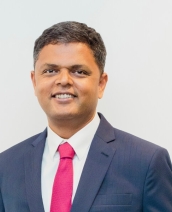Abhishek Srivastava
Principal
Abhishek has 10+ years of consulting experience in the Telecom and ICT sectors advising senior executives and decision-makers globally.

Areas of Focus
Education
Past Experience

Abhishek Srivastava first joined ADL Dubai in 2011 following the completion of his MBA and moved to work with the Singapore team in February 2020. Abhishek has worked on a variety of strategy and organization-related topics across sectors such as Telecom, Automotive, and Healthcare.
Within the TIME practice, he mainly focuses on GTM strategy, portfolio design, commercial strategy, and regulatory strategy as well as on commercial due diligence and the business impact of emerging techno-commercial trends. In this regard, Abhishek has been leading the ADL TIME practice in Southeast Asia over the last few months. Abhishek is working actively to grow two main TIME practice platforms – Telecom – with MNOs, MVNOs, and Regulators in the region and TaE (TIME as Enabler).
In addition, Abhishek has been supporting the development of ICM on a number of topics such as CPaaS, AI, and Digital Transformation. Abhishek has helped to develop and cultivate major accounts within the TIME sector in Southeast Asia. Further to this, his contribution to developing the ADL Indonesia setup has been vital, leading successful projects for new accounts.
Abhishek holds an MBA from IIM Ahmedabad and a master's degree in Mathematics and Scientific Computing from IIT Kanpur. Prior to ADL Abhishek worked with BCG as Project Leader and Infosys as Project Manager.

Reshaping telecom investment in a next-generation world

CAN REQUIRED DIGITAL INFRASTRUCTURE OF SOUTHEAST ASIA BE BUILT PROFITABLY IN THE NEXT 5 YEARS?

Lost in translation

Consolidation onset: How to sustain accelerated CPaaS value creation

The global AI arms race - How nations can avoid being left behind

Who moved my money?

Abhishek Srivastava first joined ADL Dubai in 2011 following the completion of his MBA and moved to work with the Singapore team in February 2020. Abhishek has worked on a variety of strategy and organization-related topics across sectors such as Telecom, Automotive, and Healthcare.
Within the TIME practice, he mainly focuses on GTM strategy, portfolio design, commercial strategy, and regulatory strategy as well as on commercial due diligence and the business impact of emerging techno-commercial trends. In this regard, Abhishek has been leading the ADL TIME practice in Southeast Asia over the last few months. Abhishek is working actively to grow two main TIME practice platforms – Telecom – with MNOs, MVNOs, and Regulators in the region and TaE (TIME as Enabler).
In addition, Abhishek has been supporting the development of ICM on a number of topics such as CPaaS, AI, and Digital Transformation. Abhishek has helped to develop and cultivate major accounts within the TIME sector in Southeast Asia. Further to this, his contribution to developing the ADL Indonesia setup has been vital, leading successful projects for new accounts.
Abhishek holds an MBA from IIM Ahmedabad and a master's degree in Mathematics and Scientific Computing from IIT Kanpur. Prior to ADL Abhishek worked with BCG as Project Leader and Infosys as Project Manager.

Reshaping telecom investment in a next-generation world

CAN REQUIRED DIGITAL INFRASTRUCTURE OF SOUTHEAST ASIA BE BUILT PROFITABLY IN THE NEXT 5 YEARS?

Lost in translation

Consolidation onset: How to sustain accelerated CPaaS value creation

The global AI arms race - How nations can avoid being left behind

Who moved my money?
More About Abhishek
- Indian Institute of Management, AhmedabadMaster of Business Administration (MBA)
- Indian Institute of Technology, KanpurMasters in Mathematics and Scientific Computing
- Boston Consulting Group (BCG)Project Leader
- InfosysProject Manager
